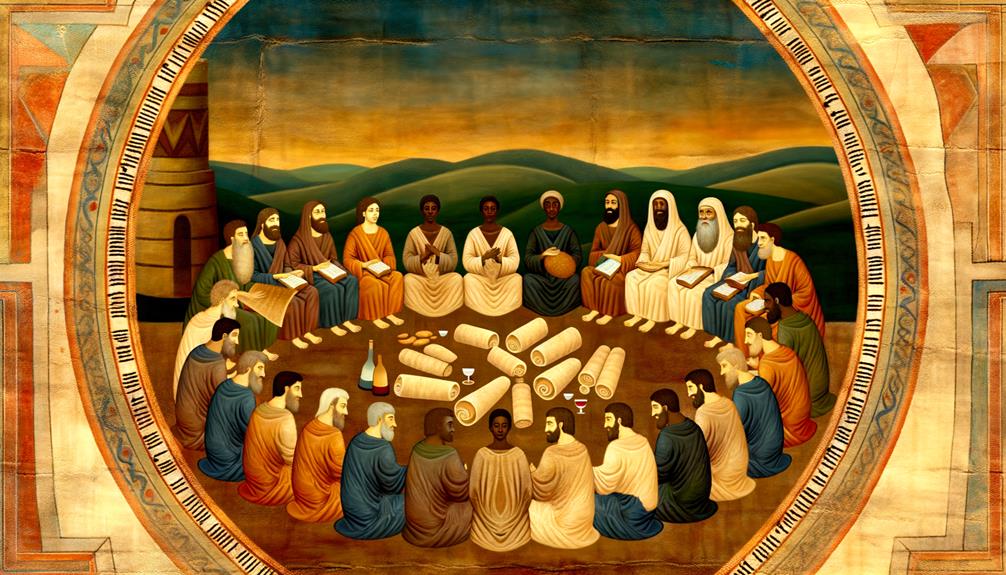Meaning of Koinonia According to Bible: Fellowship and Unity
The term ‘koinonia‘ in the Bible, derived from the Greek, denotes profound fellowship and communal participation among believers, embodying a deep spiritual connection and mutual sharing (Acts 2:42). It underscores unity and interdependence within the body of Christ, emphasizing both vertical fellowship with God and horizontal relationships within the Christian community (1 John 1:3).
The early church illustrated koinonia through shared resources and communal living (Acts 2:44-47), promoting spiritual growth and social equity. This theological concept invites believers to embody divine love and partnership in ministry, reflecting Christ’s transformative power and unity in diversity (1 Corinthians 12:12-14).
For further insights into this profound biblical concept, more exploration awaits.

Meaning of Koinonia According to the Bible: Fellowship, Unity, and Communion
| Aspect | Biblical Meaning |
|---|---|
| Fellowship & Community | “Koinonia” is a Greek word meaning fellowship, partnership, or community. In the Bible, it refers to the deep sense of connection and unity among believers, emphasizing shared faith and mutual support (Acts 2:42). |
| Sharing & Participation | Koinonia involves sharing not only in material things but also in spiritual experiences. It signifies participation in each other’s joys, struggles, and faith journeys, fostering a sense of belonging (Philippians 1:5). |
| Unity in the Body of Christ | The term is used to describe the unity of the body of Christ. It highlights the idea that believers are connected as one family in Christ, sharing in the same Spirit and purpose (1 Corinthians 12:12-13). |
| Communion with God & Others | Koinonia extends to communion with God, as well as fellowship with other believers. It involves a close, personal relationship with God, built on love, prayer, and worship (1 John 1:3, 2 Corinthians 13:14). |
| Generosity & Service | It also implies acts of generosity and service, where believers share their resources, time, and talents to support one another, reflecting the love of Christ in practical ways (2 Corinthians 9:13, Romans 12:13). |
Origin and Definition

The term ‘koinonia‘ originates from the Greek language and is mainly used in the New Covenant to describe a profound form of fellowship and communal participation among believers.
Rooted in the Greek word κοινωνία, koinonia signifies more than mere association; it embodies a deep, spiritual connection and mutual sharing.
Theologically, it encompasses the intimate bond among Christians, as depicted in passages such as Acts 2:42, where the early church is devoted to ‘the apostles’ teaching and the fellowship (koinonia), to the breaking of bread and the prayers.’
This concept emphasizes the unity and interdependence of the body of Christ, mirroring the divine communion within the Trinity.
Consequently, koinonia serves as a fundamental aspect of Christian theological and communal life.
Koinonia in Early Church

Building upon the profound theological foundation of koinonia, the early church exemplified this spiritual fellowship through communal living, shared resources, and collective worship as highlighted in Acts 2:44-47.
These verses reveal the believers’ commitment to unity and mutual support, selling possessions to meet communal needs and gathering daily for prayer and breaking bread.
Theologically, this practice of koinonia underscores the incarnation of divine love within the Christian community, reflecting the Trinitarian nature of God.
The early church’s model of koinonia not only fostered spiritual growth but also reinforced social equity, creating a tangible manifestation of God’s kingdom on earth.
Such a paradigm challenges contemporary believers to embody koinonia through intentional community life and sacrificial acts of love.
Fellowship With God

The concept of koinonia as fellowship with God encompasses spiritual intimacy, as reflected in passages such as 1 John 1:3, which speaks of fellowship ‘with the Father and with his Son, Jesus Christ.’
This spiritual communion is further manifested through prayer, which acts as a conduit for maintaining an ongoing divine relationship, highlighted in Philippians 4:6-7.
Theologically, this dynamic relationship underscores the transformative power of engaging in constant communion with the Divine, fostering spiritual growth and sanctification.
Spiritual Intimacy With God
Central to the concept of koinonia is the profound and transformative fellowship with God, as encapsulated in passages such as 1 John 1:3, which underscores the shared communion between believers and the Divine.
This spiritual intimacy signifies more than mere association; it is an active, dynamic relationship wherein believers experience the presence and guidance of God.
Theologically, it reflects the indwelling of the Holy Spirit (Romans 8:9-11), facilitating a deeper understanding of God’s nature and will. The indwelling of the Holy Spirit also empowers believers to live a life that is pleasing to God and to bear spiritual fruit (Galatians 5:22-23). The spiritual significance of 168 can be seen in the consistent practice of seeking God’s presence and guidance in every aspect of life, acknowledging the need for His empowerment and direction. This understanding of the 168 principle emphasizes the continuous and wholehearted surrender to the Holy Spirit, allowing Him to work in and through believers to fulfill God’s purposes.
Such fellowship demands a life of holiness and obedience, as emphasized in John 15:4-5, where abiding in Christ leads to fruitfulness.
Consequently, koinonia with God transforms believers, aligning their lives with divine purposes and fostering an enduring spiritual connection.
Prayer and Communion
Engaging in prayer serves as a pivotal means of cultivating koinonia, wherein believers actively communicate with God, seeking His presence, guidance, and intervention.
The Apostle Paul emphasizes this in Philippians 4:6, urging believers to present their requests to God through prayer and supplication.
Prayer, as evidenced in Matthew 6:9-13, not only facilitates intimate communion with the divine but also reflects a profound theological truth: God’s immanence and willingness to engage with humanity.
Theologically, prayer is a manifestation of believers’ reliance on divine grace, aligning their will with God’s sovereign purpose (1 John 5:14).
This spiritual practice underscores the essence of koinonia, transforming prayer into a dynamic interaction that deepens one’s fellowship with the Almighty.
Divine Relationship Dynamics
Exploring the dynamics of divine relationship, koinonia reveals the profound interconnectedness between believers and God, fundamentally rooted in scriptural teachings and theological interpretation.
This sacred fellowship is embodied in passages such as 1 John 1:3, which underscores the shared communion with the Father and His Son, Jesus Christ. Koinonia, consequently, transcends mere association, inviting believers into an intimate, transformative relationship with the Divine.
Theologically, this relationship is characterized by mutual indwelling (John 15:4) and the abiding presence of the Holy Spirit (2 Corinthians 13:14). Such interaction is not only vertical but also horizontal, as the divine connection fosters unity within the body of Christ (Ephesians 4:3).
Hence, koinonia embodies both divine intimacy and communal solidarity.
Community Among Believers

The concept of koinonia emphasizes the importance of shared faith practices and mutual support systems within the Christian community, as exemplified in Acts 2:42-47.
This passage illustrates the early believers’ commitment to the apostles’ teaching, fellowship, breaking of bread, and prayers, fostering a deep sense of unity and mutual care.
Such communal interactions underscore the theological principle that koinonia is not merely social but is inherently spiritual, rooted in the shared life in Christ.
Shared Faith Practices
Central to the concept of koinonia is the mutual participation of believers in shared faith practices, as exemplified in Acts 2:42 where the early Christians devoted themselves to the apostles’ teaching, fellowship, breaking of bread, and prayers.
These practices are not merely ritualistic but form the foundation of communal spiritual life, fostering unity and spiritual growth.
Theologically, koinonia emerges as a divine mandate for believers to embody the body of Christ through these collective actions (1 Corinthians 10:16-17).
The shared participation in sacraments, study, and communal worship signifies a deeper, divine communion, reflecting the Trinitarian fellowship of the Father, Son, and Holy Spirit.
Such praxis underscores the transformative power of communal devotion in the life of the Church.
Mutual Support Systems
Frequently, koinonia manifests in the mutual support systems among believers, where the sharing of resources, encouragement, and burdens is both a practical expression of love and a theological imperative, as seen in Galatians 6:2 which urges the faithful to ‘bear one another’s burdens, and thereby fulfill the law of Christ.’
This imperative reflects the early Christian community’s ethos, as illustrated in Acts 2:44-45, where believers held all things in common and distributed aid based on need.
Theologically, such practices are rooted in the recognition of the Body of Christ (1 Corinthians 12:12-27), where each member’s welfare impacts the whole.
Consequently, mutual support systems serve not merely as charitable acts but as essential expressions of ecclesial unity and divine love.
Sharing and Generosity

In the context of koinonia, sharing and generosity are exemplified through the early Christian community‘s practice of holding all things in common, as described in Acts 2:44-45.
This passage illustrates the theological foundation of koinonia, emphasizing the communal stewardship of resources. The act of selling possessions and distributing them according to need reflects a profound manifestation of agape love, a core principle of Christian ethics.
Theologically, this practice underscores the belief in the interdependence of believers and the divine mandate for social equity. By fostering a culture of generosity, the early Church not only met material needs but also strengthened spiritual bonds, embodying the sacrificial love of Christ and serving as a demonstration of the transformative power of genuine Christian fellowship.
Partnership in Ministry

The concept of koinonia extends beyond sharing and generosity to encompass a profound partnership in ministry, as evidenced by the collaborative efforts of the Apostle Paul and his fellow workers in spreading the Gospel (Philippians 1:5). This partnership is characterized by mutual support, shared mission, and communal responsibility.
Paul frequently acknowledges the indispensable role of his co-laborers, illustrating koinonia as essential for effective ministry.
- Mutual Support: Encouraging one another in faith (Galatians 6:2)
- Shared Mission: Co-laboring in evangelistic efforts (1 Corinthians 3:9)
- Communal Responsibility: Bearing one another’s burdens (Romans 15:1)
Thus, koinonia in ministry underscores a collective endeavor, grounded in theological and scriptural foundations.
Unity in Diversity

Koinonia also manifests as unity in diversity, where the body of Christ, composed of many members with varying gifts and backgrounds, functions harmoniously to glorify God (1 Corinthians 12:12-14).
The Apostle Paul articulates that though believers are many, they form one body, unified in Christ. This theological principle underscores the notion that diversity is not merely tolerated but is essential for the fullness of the Church’s mission.
Each member contributes uniquely, enriching the communal life and witness of the Church. This unity in diversity reflects the Trinitarian nature of God—one essence in three distinct persons—and serves as a confirmation to the unity and magnificence of God’s creation.
Consequently, koinonia fosters a collective identity that transcends individual differences.
Spiritual Gifts and Koinonia

Spiritual gifts, as bestowed by the Holy Spirit, serve as integral components in the practice of koinonia, facilitating the edification and mutual support among believers (1 Corinthians 12:4-7). These gifts, diverse in nature yet unified in purpose, enhance the communal life of the church by promoting spiritual growth and harmony.
Paul’s epistles highlight the theological foundation for understanding how such gifts contribute to the communal fabric of koinonia.
Diversity of Gifts: Each believer receives unique gifts, reflecting the manifold grace of God (1 Peter 4:10).
Unity in Purpose: All gifts aim to build up the body of Christ (Ephesians 4:12).
Interdependence: Members rely on each other’s gifts, fostering mutual dependence (Romans 12:5).
Stewardship: Proper use of gifts glorifies God and serves others (1 Corinthians 12:7).
Living Out Koinonia

Engaging in koinonia requires believers to actively embody the principles of fellowship, love, and mutual support as demonstrated in the early Christian community, particularly in Acts 2:42-47. This passage highlights the communal living and sharing of resources, where believers “devoted themselves to the apostles’ teaching and the fellowship, to the breaking of bread and the prayers” (Acts 2:42, ESV).
The theological underpinning of koinonia lies in its reflection of the divine nature of the Trinity—unity, self-giving love, and relational harmony.
Living out koinonia today involves a commitment to communal worship, consistent prayer, and sacrificial giving, thereby manifesting the transformative power of the Gospel in tangible, daily interactions within the faith community.
Conclusion
The concept of koinonia, deeply rooted in biblical theology, encompasses fellowship, community, and shared life among believers.
Notably, Acts 2:44-45 reveals that early Christians held all things in common, symbolizing profound unity. This statistic underscores the radical nature of koinonia, which transcends mere association and calls for sacrificial living and mutual support.
Through koinonia, the early church exemplified a divine partnership, fostering an environment of generosity, spiritual gifts, and unity in diversity, thereby modeling the essence of Christian communal life.






